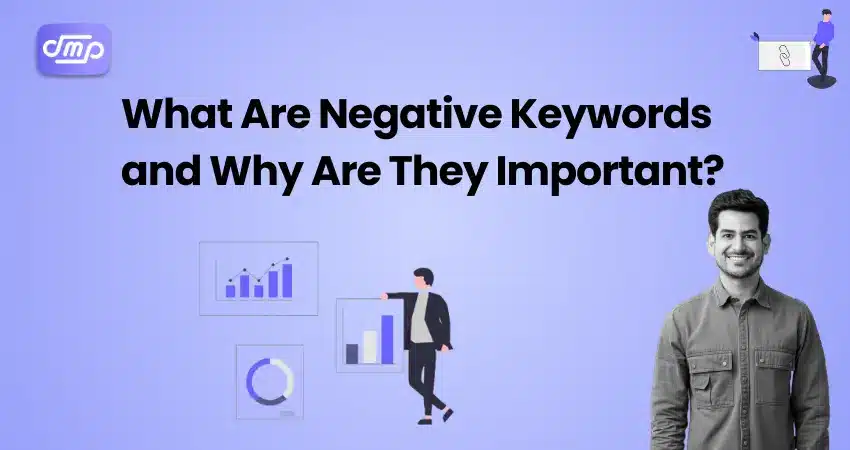
- January 29, 2025
- Keywords, seo
- Search Engine Optimisation (SEO)
Table of Contents
Negative keywords are specific terms or phrases you omit from your pay-per-click (PPC) advertising campaigns to keep them from appearing in unrelated searches.
By including negative keywords, you can ensure that your ads are only shown to the appropriate audience, avoiding wasted ad spend and enhancing campaign performance.
Negative and normal keywords serve opposing functions in PPC advertising campaigns:
- Regular keywords are the words or phrases you use to trigger your adverts. When someone searches for these terms, your ad has a chance to appear if it meets the campaign settings. For example, if your keyword is “running shoes,” your ad could appear in searches for “best running shoes” or “buy running shoes online.”
- These are the words or phrases that you eliminate to keep your ads from appearing for irrelevant searches. For example, if “cheap” is a negative keyword, your ad will not appear for searches that include “cheap running shoes,” even if “running shoes” is a regular keyword in your campaign.
- Regular keywords reach relevant audiences, whereas negative keywords exclude irrelevant or unqualified traffic. Together, they ensure that your budget is used wisely.
Why Are Negative Keywords Important?
Negative keywords are critical for optimizing your PPC campaigns since they allow you to fine-tune your audience targeting, boost ad performance, and stretch your advertising budget. Here is why they matter:
- Avoid Wasted Ad Spend: Negative keywords ensure that your advertisements do not display for irrelevant search searches. This reduces clicks from visitors who are unlikely to convert, saving money that can be put towards more relevant traffic. For example, if you offer high-end furniture and exclude the keyword “cheap,” your ad will not display for searches such as “cheap furniture,” reducing unqualified leads.
- Increase the Click-Through Rate (CTR): Negative keywords exclude irrelevant queries, ensuring that your adverts are only seen by people who are interested in your products. This enhances the likelihood of receiving clicks from the intended audience, raising your CTR.
- Improve ad relevance: Google and other search engines give higher quality scores to adverts that are more relevant. Using negative keywords helps to keep your ads relevant, ensuring that they match user intent.
- Increase Conversion Rates: When your adverts reach the correct people, there is a better possibility of conversions. Negative keywords attract more qualified leads by screening out irrelevant queries, which improves the total conversion rate of your campaign.
- Optimize campaign metrics: Negative keywords have a beneficial impact on important metrics such as cost-per-click (CPC) and return on ad spend (ROAS). This allows you to make better use of your advertising money and run more effective campaigns.
- Target the Right Audience: Negative keywords assist reduce queries that may overlap with your keywords but are unrelated to them. They overlap with your keywords yet are irrelevant to your objectives. This ensures that your adverts reach the people who are most likely to benefit from your products or services.
Negative keywords play an important role in PPC campaign management. They ensure that your adverts reach the intended target, prevent waste, and boost the performance and profitability of your advertising campaigns.
How to Use Negative Keywords Effectively

Strategic use of negative keywords guarantees that your PPC campaigns are focused, cost-effective, and performance-optimized. Here’s a step-by-step method on utilizing negative keywords effectively:
- Identify irrelevant search terms: Begin by reviewing your existing search term reports to identify phrases that trigger your advertising but do not correspond with your objectives. Tools to Use: Google Ads Search Term Report. Tools for keyword research include SEMrush and Ahrefs, as well as analytics systems for tracking unqualified visitors. For example, if you sell expensive timepieces, you may want to avoid using terms like “cheap watches” or “second-hand watches.”
- Create a negative keyword list: Make a detailed list of negative keywords for your advertising. Sort them into categories for easier administration. Broad Categories to Consider: Price-related phrases include “free,” “cheap,” and “discount”. Irrelevant product kinds include “DIY, “Irrelevant product types: “DIY,” “repair,” and “used” Location-related terms: If you do not ship globally, remove the term “international” or specific countries.
- Select the appropriate match type for negative keywords: Negative keywords have three match types to control their specificity.
- Broad Match: Excludes all searches containing the term in any order.
- Phrase Match: Excludes searches that include the exact phrase in the same order.
- Exact Match: Excludes searches that contain the exact keyword.
Choose a match type based on how specific you want your exclusions to be.
- Continuously monitor and update: Regularly check search term reports to uncover new negative keyword prospects. PPC campaigns evolve, so keep your list up to date to ensure continual optimization. Schedule periodic audits to add new negative keywords and eliminate ones that are no longer relevant.
- Use tools to automate and refine negative keyword management.
- Google Keyword Planner: Identifies search phrases to exclude.
- Negative Keyword Generators: Tools such as WordStream help to automate the discovery process.
- Scripts & Automation: You can use Google Ads scripts to automate mass updates.
- Use Negative Keywords Across Campaigns: To ensure consistent targeting, use your negative keyword list at the campaign or ad group level. Exclusions at the ad group level are specific to highly focused advertising groupings.
- Avoid overusing negative keywords: While it is critical to remove irrelevant visitors, using too many negative keywords will limit your ad’s reach. Balance is essential for campaign efficacy.
- Test and Experiment: Conduct A/B testing to determine the impact of negative keywords on campaign performance. Adjust your list based on the results to further optimize.
How Negative Keywords Enhance PPC Performance

Negative keywords are crucial for increasing the efficiency and efficacy of your PPC campaigns. Here’s how they improve performance.
- Reduce wasted ad spend: Negative keywords exclude irrelevant or low-converting search phrases, preventing your adverts from being exposed to unqualified viewers. This lowers wasteful clicks that do not result in conversions, allowing you to focus your cash on high-potential searches. For example, if you sell high-end fitness equipment, eliminating phrases like “free” or “cheap” assures that your money does not go to waste on bargain hunters.
- Improve the Click-Through Rate (CTR): When your advertising are only displayed to the appropriate audience, they are more likely to be clicked. Excluding irrelevant queries guarantees that the users who view your ad are actually interested, which leads to a higher CTR.
- Increase conversion rates: Negative keywords generate more qualified leads by screening out traffic from uninterested or irrelevant individuals. This means that a greater proportion of users who click your ad are likely to convert, boosting your overall conversion rate.
- Increase Quality Score: Google Ads awards higher Quality Scores to advertisements that are highly relevant. This not only increases your ad position but also lowers your cost-per-click (CPC), hence improving the overall performance of your campaign. Negative keywords add to this by removing irrelevant impressions.
- Ensure Better Ad Relevance: Negative keywords help you target your adverts to the correct audience by removing irrelevant search phrases. This enhances the likelihood that your ad will be regarded as useful and relevant, hence boosting user experience and campaign results.
- Improve Targeting Efficiency: Negative keywords assist you narrow down your target audience to those who are more likely to convert. This helps you to tailor your ads to high-value demographics, geographies, and search intent.
- Lower the cost-per-click (CPC): Fewer irrelevant clicks result in a higher CTR, which tells Google that your ad is doing successfully. This can result in decreased CPC over time, allowing you to achieve a higher ROI from your advertising.
- Improve campaign insights: Analyzing the performance of your negative keyword strategy provides useful information about your target audience’s behavior. It helps to refine not only your PPC campaigns.It improves not only your PPC advertising but also your overall marketing strategy.
Negative keywords improve PPC performance by removing irrelevant traffic, increasing CTR and conversion rates, and reducing expenses. They ensure that your adverts are properly targeted, resulting in greater results and higher returns on investment.
Conclusion
Negative keywords are an effective technique for enhancing your PPC campaigns. By removing irrelevant search phrases, you can save money on ads, enhance CTR, and attract more quality leads to your website. This digital marketing strategy not only improve ad relevancy and quality score but also increase the overall efficiency and ROI of your campaign.
A well-managed negative keyword strategy guarantees that your advertising reaches the correct audience at the right moment, thus increasing conversions and maximizing your money. Regularly evaluating and upgrading your negative keyword list is critical for staying ahead of new trends and ensuring the efficacy of your advertising.
By correctly utilizing negative keywords, you can ensure that every click counts, getting you closer to reaching your advertising goals with better advertising objectives and better clarity and success.











